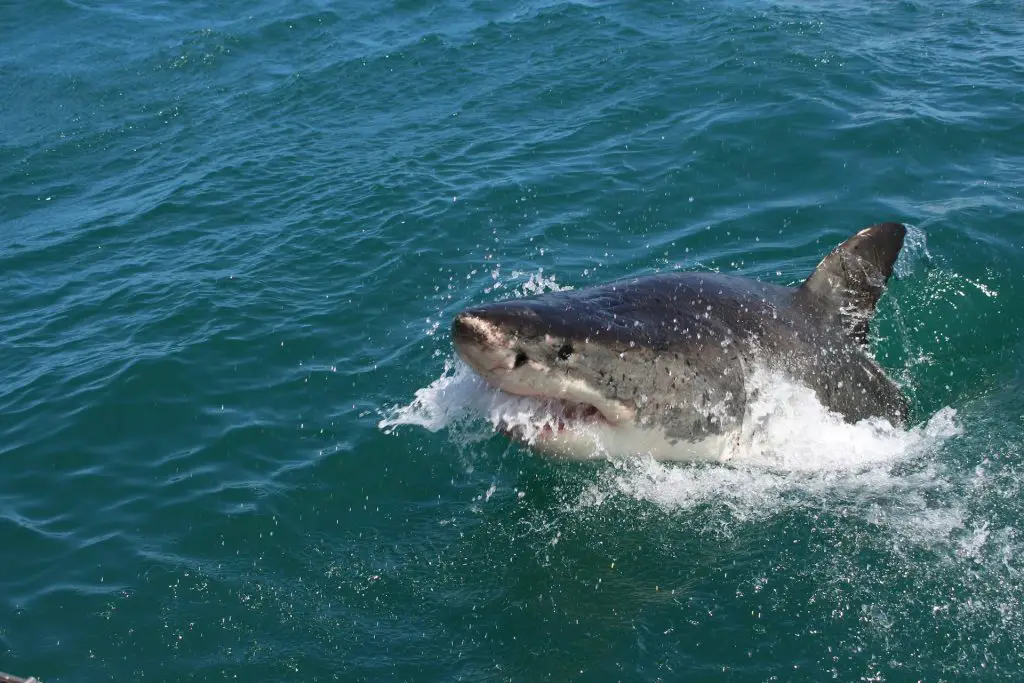The thrill of encountering one of nature’s most magnificent and feared creatures, the great white shark, has lured adventurous travelers to South Africa for years. South Africa’s waters are home to a significant population of these apex predators, making it one of the prime destinations for cage diving experiences. In this article, we will delve into the world of cage diving with great white sharks in South Africa, exploring the safety measures, environmental impact, and the unforgettable experience of coming face-to-face with these majestic creatures.
The Great White Sharks of South Africa
Before we dive into the exhilarating world of cage diving, it’s essential to understand why South Africa is such a hotspot for great white sharks. The country’s waters, particularly around Cape Town and Gansbaai, provide ideal conditions for these apex predators. The cold, nutrient-rich waters of the Atlantic Ocean collide with the warmer Indian Ocean currents, creating a diverse ecosystem that attracts a variety of marine life. Seals, dolphins, and various species of fish thrive in this environment, serving as the primary food source for great white sharks.
The coastal town of Gansbaai, located about 2 hours from Cape Town, is often referred to as the “Great White Shark capital of the world.” This reputation is well-deserved as the area boasts a high concentration of great whites due to the presence of a nearby seal colony at Dyer Island, which serves as a natural hunting ground for the sharks.
The Rise of Cage Diving
The idea of cage diving with great white sharks emerged as a way for thrill-seekers and wildlife enthusiasts to witness these incredible creatures up close while minimizing the risks associated with shark encounters. Cage diving allows people to enter the ocean within a secure, submerged cage, providing a thrilling and relatively safe opportunity to observe great white sharks in their natural habitat.
Cage diving gained popularity in South Africa during the late 20th century when pioneering individuals recognized the potential for eco-tourism and the importance of raising awareness about shark conservation. Over the years, the industry has grown, attracting tourists from all corners of the globe.
Safety Measures
Safety is a paramount concern when cage diving with great white sharks in South Africa. Operators in the region prioritize the well-being of their clients and the sharks themselves. Here are some key safety measures in place:
Experienced Crew: Reputable cage diving companies employ experienced crews with in-depth knowledge of shark behavior and marine safety protocols. Skilled divers and marine biologists often lead the tours, ensuring that participants receive proper guidance.
Sturdy Cages: The cages used for shark encounters are typically made from strong, corrosion-resistant materials to withstand the force of a great white shark’s bite. Cages are securely attached to the boat and equipped with safety bars to prevent direct contact between participants and the sharks.
Briefing and Training: Before entering the cage, participants receive thorough briefings on safety procedures and cage diving etiquette. This includes instructions on how to enter and exit the cage safely and how to interact with the sharks from within the cage.
Baiting Techniques: To attract sharks to the cage area, operators use baiting techniques involving fish or fish-based products. These methods are designed to minimize the risk to both humans and sharks. It’s important to note that operators are required to adhere to strict regulations to ensure responsible baiting practices.
Compliance with Regulations: South Africa has established regulations governing shark cage diving to protect both humans and the sharks. Operators must obtain permits and comply with guidelines set by the Department of Environment, Forestry, and Fisheries.
It’s worth emphasizing that while cage diving minimizes risks, encounters with great white sharks are inherently unpredictable. Participants should be prepared for a range of emotions, from excitement to fear, and should follow the instructions of the crew at all times.
Environmental Impact
While cage diving provides a unique opportunity to observe great white sharks, concerns have been raised regarding its potential impact on these apex predators and the marine environment. Here are some key points to consider:
Habituation: Some argue that frequent interactions with cage diving operations can lead to habituation in great white sharks. Habituation occurs when sharks become accustomed to the presence of boats and humans, potentially altering their natural behavior patterns, including hunting and migration.
Baiting: Baiting, a common practice to attract sharks to the cage diving area, can have unintended consequences. Critics argue that this may alter the sharks’ natural diet and migration patterns, though the extent of these effects remains a subject of scientific debate.
Conservation Awareness: On the positive side, shark cage diving has contributed to raising awareness about shark conservation. Many operators use their platforms to educate participants about the importance of protecting these apex predators and the marine ecosystems they inhabit.
Regulations and Best Practices: To mitigate environmental impact, strict regulations and best practices are enforced in South Africa. These guidelines aim to minimize any negative consequences of cage diving on great white sharks and their habitats.
The Experience of Cage Diving
Despite the ongoing debates about its environmental impact, cage diving offers a once-in-a-lifetime experience that few can forget. Here’s what you can expect during a typical cage diving adventure:
The Journey: The adventure usually begins with a scenic boat ride from the harbor to the designated shark cage diving area. Along the way, you’ll have the chance to take in breathtaking coastal views and learn more about the local marine ecosystem from the crew.
Getting into the Cage: Once the boat reaches the dive site, participants are divided into smaller groups and take turns entering the submerged cage. Participants wear wetsuits and are usually equipped with snorkeling gear. The cage is then lowered into the water, partially submerged, allowing participants to stay close to the surface and breathe comfortably.
Shark Encounters: As the crew deploys bait to attract great white sharks, the excitement and anticipation among participants build. When a shark approaches the cage, divers can witness the awe-inspiring sight of these magnificent creatures up close. It’s a heart-pounding experience as the massive sharks glide by, showcasing their power and grace.
Photography and Observation: Participants have the opportunity to take photos and videos of the sharks from within the cage. Many operators provide underwater viewing windows or bars, ensuring unobstructed views. The encounters are often surprisingly intimate, as the sharks swim just inches from the cage, making eye contact with those inside.
Above and Below: Some cage diving operators offer the option to view the sharks from both above and below the water. Those who are comfortable with diving can descend below the surface in a separate cage for a more immersive experience.
Return to the Surface: After approximately 20-30 minutes in the cage, participants are hoisted back to the surface. There, they can share their experiences with fellow adventurers and reflect on the incredible encounter.
Cage diving with great white sharks in South Africa offers a unique blend of adventure, education, and conservation awareness. While the practice has its share of debates and concerns, responsible operators continue to prioritize safety and environmental sustainability.
For those seeking an unforgettable adventure and a chance to witness one of the ocean’s most magnificent creatures up close, a cage diving experience in South Africa is an opportunity like no other. It’s a reminder of the intricate relationship between humans and the natural world, highlighting both the need for conservation and our enduring fascination with the wild. So, if you’re ready to embark on a thrilling journey into the deep blue, the great white sharks of South Africa await your visit, offering an adventure you’ll treasure for a lifetime.
Tips for a Memorable and Responsible Cage Diving Experience
If you’re considering cage diving with great white sharks in South Africa, here are some tips to ensure you have a memorable and responsible experience:
Choose a Reputable Operator: Research and choose a cage diving operator with a strong reputation for safety, environmental responsibility, and ethical practices. Look for certifications or affiliations with organizations such as the South African Shark Conservancy.
Respect the Sharks: Remember that you are entering the sharks’ natural habitat, and it’s essential to treat them with respect. Follow the instructions of the crew, maintain a calm demeanor, and avoid any sudden movements or loud noises that may startle the sharks.
Practice Responsible Baiting: Support operators that adhere to responsible baiting practices. Responsible baiting minimizes environmental impact while maximizing the chances of shark sightings. Operators should not overuse bait or rely on it solely to attract sharks.
Eco-Education: Take advantage of the educational aspects of your cage diving experience. Listen to the guides and marine biologists on board, as they provide valuable insights into shark behavior, conservation efforts, and the importance of protecting marine ecosystems.
Capture Memories Responsibly: While it’s tempting to capture photos and videos of the sharks, do so responsibly. Avoid reaching out of the cage to get a closer shot, and always ensure your equipment is secured to your person to prevent any accidental drops into the ocean.
Understand Environmental Impact: Educate yourself about the ongoing debates and research regarding the environmental impact of cage diving. Stay informed and support initiatives that aim to strike a balance between shark tourism and conservation.
Be Prepared: Be mentally prepared for the experience. Cage diving can be both exhilarating and intimidating, so understanding the potential range of emotions will help you fully enjoy the adventure.
Dress Appropriately: Wear appropriate clothing and follow the provided instructions for wearing wetsuits and other gear. Being properly dressed ensures your comfort and safety during the excursion.
Choose Your Location: South Africa offers several cage diving locations, including Gansbaai and Mossel Bay. Research each location’s unique characteristics and choose the one that aligns with your preferences and travel plans.
Support Conservation: Consider contributing to shark conservation efforts by supporting organizations and initiatives that work towards the protection of great white sharks and their habitats.
Cage diving with great white sharks in South Africa is a remarkable adventure that allows you to come face-to-face with one of the ocean’s most iconic creatures. While the practice is not without controversy, responsible operators prioritize safety, environmental conservation, and education, making it possible for tourists to enjoy this thrilling experience while contributing to shark conservation efforts.
As you prepare for your cage diving adventure, remember that it’s not just about the adrenaline rush but also about fostering a deeper connection to the natural world. By choosing ethical operators, respecting the sharks and their environment, and staying informed about the ongoing conservation efforts, you can ensure that your cage diving experience is both memorable and responsible. So, take the plunge, embrace the awe-inspiring beauty of the great white sharks, and help protect these magnificent creatures for future generations to admire and cherish.







